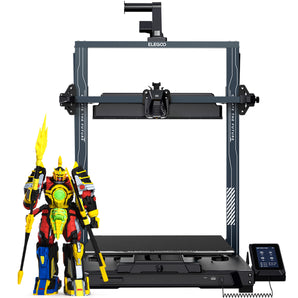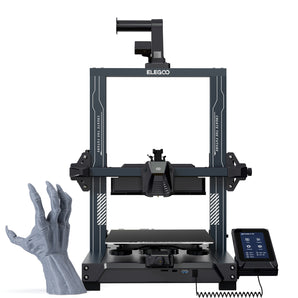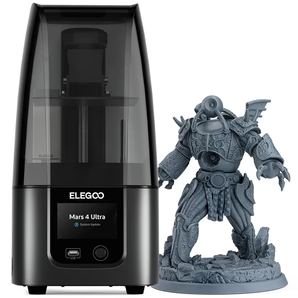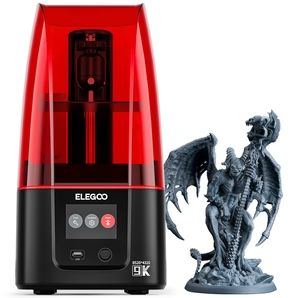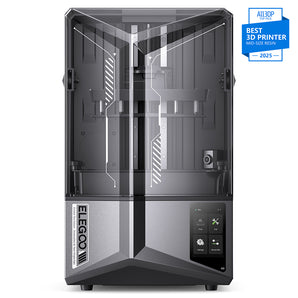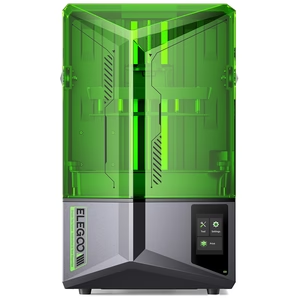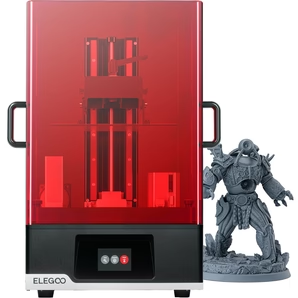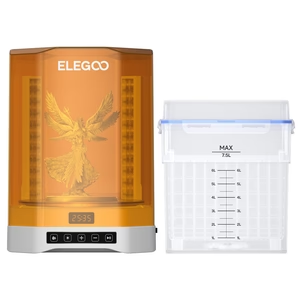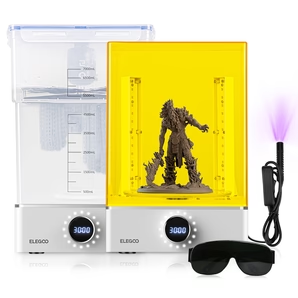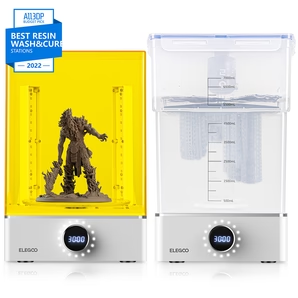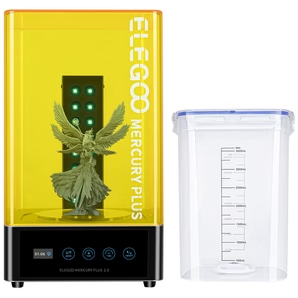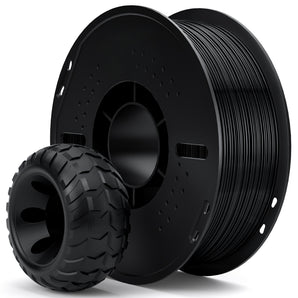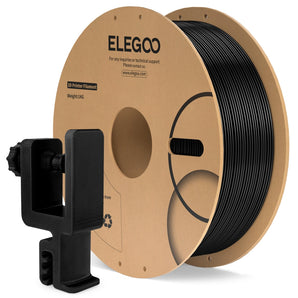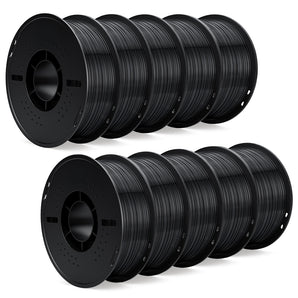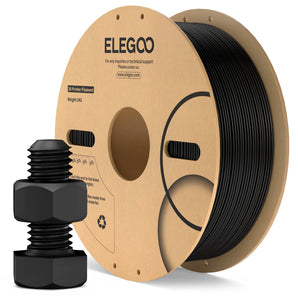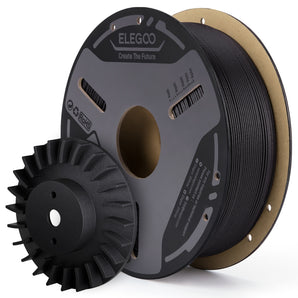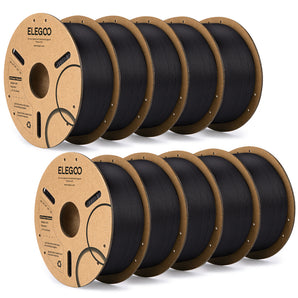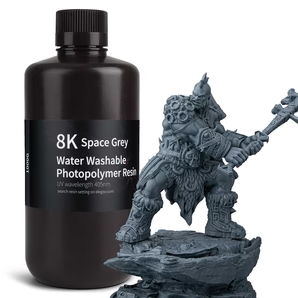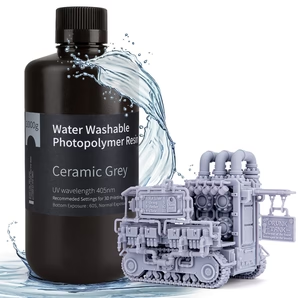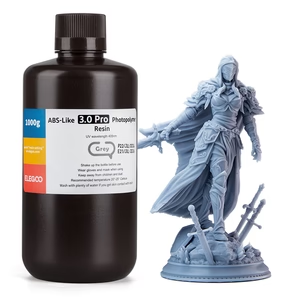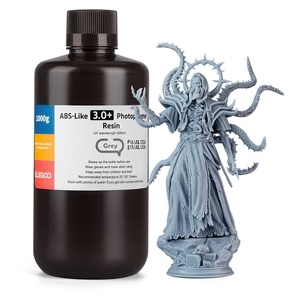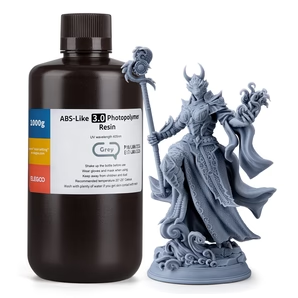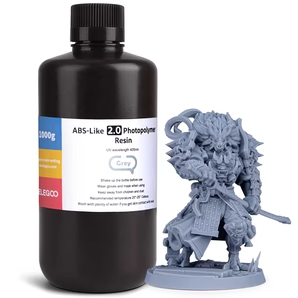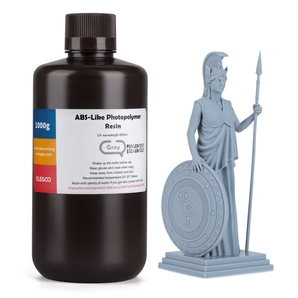Best Budget Resin Printer in 2021: Full 3D Printer Price List

3D Resin printers are used to print high-quality multi-dimensional objects. They are a helpful tool in industries where design samples need to be made to test for functionality or illustrative purposes. Such samples include jewelry placements, dentures, architectural mock-ups, among many others.
For a long time, resin printers remained inaccessible due to their high cost. Their design was equally not too suitable for small-scale operations or home use. However, thanks to new innovative design approaches you can now buy a 3D resin printer on a budget and easily set it up in your home office.
Ready to shop? Well, before you step out here is a list of budget 3D resin printers and everything you need to know about getting one.
How do 3D Resin Printers Work?

When shopping for a 3D resin printer on a budget, it is advisable to have an understanding of how such printers work. This is because how a 3D printer works is determined by its features and the more advanced the features a resin printer has, the more it is likely to cost.
One of the more popular systems used by quality 3D resin printers is known as stereolithography(SLA). Here is how it works.
- The printer roller spreads a thin layer of a UV-sensitive polymer fluid on a platform
- Computer-controlled laser beams on the polymer fluid tracing the outline of the object to be printed
- The parts of the polymer fluid touched by the laser beam harden to form the 3D print
- This process is repeated in different layers until your design is fully formed into a tangible 3D model
- Upon completion, the 3D model is lifted out of the printer's resin tank
On the other hand, LCD-based printers used and LCD screens coupled with LED lighting systems. These lighting systems have individual LEDs that are strategically placed. During printing, these LED lamps go on and off illuminating the resin at particular areas depending on the design to solidify the resin. There are monochrome and RGB LCD screens.
The main difference between most printer brands is that while they largely follow this same printing process, some have enhanced features. For instance, resin printers with mono-LCD work faster than those with RGB LCD. As a result, they cost more. Other features like 4K print resolution and fast-curing resin are equally helpful and may attract a higher price tag. The trick here would be to evaluate the value a resin printer offers versus its price.
Speaking of evaluation, let us have a look at some top budget resin printer picks.
Elegoo Mars 3D Resin Printers
At first glance, the Elegoo Mars brand of resin printers may seem too good to be true. They are affordable and promise way more than you would expect for that price. The good news is, they deliver what the brand says they will and possibly even more. The quality of their prints is great and the more advanced models have some of the best user-friendly features in the market.
The Elegoo Mars

If you are looking for a cheap resin 3D printer that delivers good prints, consider the Elegoo Mars. It has a compact design and costs less than $200. Most of its structure comes already assembled to ease the setup process for users. Once you have the z-axis at zero and the leveling screw in place, you can start printing. It has a 2K HD masking LCD which yields prints with great resolution along both the X and Y-axis.
On cost, this is the lowest-priced Elegoo Mars 3D resin printer. It is, nonetheless, quite efficient in its performance. It would also save you input costs as the CHITUBOX system allows you to hollow out your design model before slicing thereby preventing the wastage of resin.
Highlight features
- 2K HD masking LCD
- Fast slicing with both CHITUBOX and open source software
- Integrated computer board with USB port for offline printing
- The color touch screen provides real-time print previews
Pros
- Affordable
- Compact design
- Fairly good resolution
- Easy user-friendly setup process
Cons
- The prints are not very detailed
- The print speed is not very high
Elegoo Mars Pro
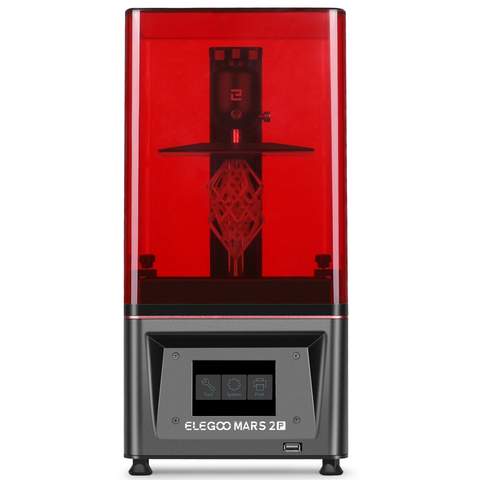
The Elegoo Mars Pro is an improved version of the Elegoo Mars and costs just about $60 more. In this model, the Elegoo brand went the extra mile to ensure that users have the best possible experience.
For starters, you can say goodbye to the pungent smell of resin during printing. The Elegoo Mars Pro resin vat has a silicone cover to prevent the emission of resin fumes to the surrounding atmosphere. Further, it has an activated carbon tower that absorbs and deodorizes the fumes before they are ventilated out of the printer. That said, Elegoo resins are great quality and not excessively pungent.
On printing and print quality, the Elegoo Mars Pro equally offers more than its predecessor. The z-axis linear guideway, for instance, has been built to be more stable for improved precision. This additionally yields 3D prints with a smoother finish and less conspicuous layers. The matrix lighting system also has improved 50-watt lights which deliver a superior quality of prints in a shorter exposure time.
Highlight features
- Front USB port
- 2K LCD projector with a 0.01mm minimum layer height
- It uses the compressed .ctb file format instead of the bulkier .cbddlp format
- 1-year warranty for the printer
- 6-month warranty of 2K LCD excluding the FPE film
Pros
- No hazardous resin fumes
- Compact lightweight structure
- Easy to set up
- Improved print quality and print speeds even for large designs
Cons
- Can be loud
- No mono-LCD
Elegoo Mars Pro 2

The Elegoo Mars Pro 2 will set you back slightly over $300. However, when you take a quick look at its features, you start to see why it might be one of the best 3D resin printers under 500. It brings with it all the great features of the Elegoo Mars and amps that up with even more advantageous features.
On this model, Elegoo finally offers consumers the mono-LCD feature with a 2K HD resolution. It cures resin layers super fast and delivers a remarkable quality of prints. Moreover, it is coupled with a new lighting system to ensure that print quality is consistent and the design details are just right.
In terms of user experience, you still get to enjoy a resin-fume-free printing session. Plus, if you had language-barrier challenges with previous models, the Elegoo Mars Pro 2 interface is operable in 12 languages.
Highlight features
- Mono-LCD printing
- Improved LED lighting system
- The package includes 2 extra FEP films
- 1-year warranty on the printer
- 6-month warranty on the 2K LCD excluding FEP film
Pros:
- High-quality prints
- Durable design
- Mono-LCD is low maintenance
- Multilingual accessibility
Cons
- The LCD is a bit sensitive and prone to scratches
Elegoo Saturn 4K

The Elegoo Saturn 4K can easily be labeled as the crown jewel of Elegoo 3D resin printers thanks to its top-tier features. This is probably also why it has a $500 price tag. Which brings us to the question, is it worth it?
The monochrome LCD on this 3D resin printer produces an unmatched quality of print models. It offers a 4K resolution with 3840×2400 pixelation which is quite high by any standard. Moreover, the double linear z-axis guideway and sandblasted printing platform provide extra stability for the printing process. Subsequently, you would realize print models with smooth finishes and barely visible layer lines.
If you are tired of waiting for every miniature model to print before loading up the next, then the Elegoo Saturn 4K may be the perfect gift for you. It has a wide 8.9-inch printing surface that allows you to print more than one model at the same time. Better still, even during such multitasking, the printing quality and speed remain high.
You would imagine the list of features ends there but, no, there is more. At the back of your Elegoo Saturn 4K, you will find an ethernet port and the printer has an in-built 4GB data disk. These two features make it possible to transfer files through a Local Area Network (LAN). This could prove especially helpful in a company setting where designs may need to be shared by staff members from different departments.
Highlight Features
- 8.9-inch printing surface
- 4K resolution monochrome LCD
- Ethernet port
- 4GB inbuilt data disk
- A build plate with set screws for dependable stability
- Improved 54 UV LED lighting system
- Resin fume deodorizing chamber with activated carbon
- 1-year warranty on the printer excluding tge 4K LCD, FEP film, and toolkit
Pros:
- Super-fast printer with a performance rate of 1.5 to 2 seconds per layer
- high-resolution print models
- Convenient file sharing over LAN
- High precision due to its steady guideway
Cons:
- The LCD is still as sensitive as that of previous Elegoo models
- Some noises are to be expected during printing
Creality LD-002R

The Creality LD-002R can be yours for the budget price of about $230-$250. It is the closest thing to the Elegoo Mars Pro as it offers mostly similar features. However, they are not identical in their performance.
The LD-002R has a 2K mono LCD that prints fast and with great precision. It can handle print sizes as large as 119×65×160mm with deft efficiency. Its lighting system is bright and ensures that no part of your print model is realized with incomplete detailing. This advanced lighting system also facilitates even printing and has one of the best heat-dissipation mechanisms on this list.
The Creality brand is big on safety during printing and is invested in consumer comfort. Each unit of this 3D resin printer comes with a face mask and a pair of handling gloves. The printer is also fitted with a pouch of activated carbon to assist with the filtration of resin fumes.
Highlight Features
- 2K mono LCD
- Sizable print volume
- Quality lighting system with heat dissipation
- Resin fume filtration
Pros:
- Affordable price for a mono LCD resin printer
- Great lighting delivers detailed prints
- Works with both standard and high elasticity resins
- Safety gear inclusive
Cons:
- The resin vat can be a little unstable if you are not sure how to fix it right
- The setup procedure is easy but can be confusing
Anycubic Photon S
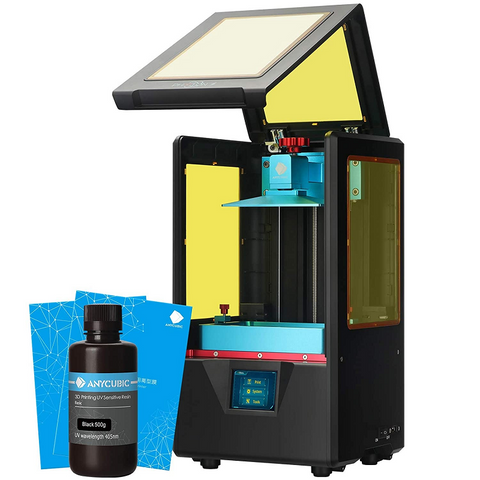
The Anycubic Photon S is an upgraded model of the previous entry-level Anycubic Photon 3D resin printer. It costs about $300 depending on whether you request any extras and where you buy it from. For perspective, the Anycubic Photon was relatively well-received but it presented challenges such as:
- Resin fumes
- Instability during printing which yields prints with very visible layer lines
- Loud noises and vibrations during printing
As a remedy to these issues, the Anycubic Photon S has a dual Z-axis rail for better stability during the printing process. It further has a double-sanded aluminum platform which enhances the adhesion of the prints and supports the dual-rail in improving stability. As a result, you can expect resin print models with a smoother finish and less visible structural lines.
Print quality and detail have equally been addressed in this Anycubic 3D resin printer model. It is equipped with upgraded UV lighting that delivers even illumination. Consequently, details as minute as texturization are captured in the slicing process.
Highlight features
- 3 double filtration systems to filter out resin fumes before they are expelled from the resin tank
- Offline printing
- Dual rail Z-axis structure
- An effective UV lighting system
- 2560×1440 LCD XY resolution
Pros:
- Reduced resin fume emissions
- Reduced vibrations, noise, and instability
- An active online community of Anycubic Photon 3D resin printer users
- Easy to assemble with only leveling grub screw
Cons
- Its print resolution could be better
- Slow print speeds
Phrozen Sonic Mini 4K

The Phrozen Sonic Mini 4K is priced at about $350 to $400. It has a quality build that you can tell will not fall apart on you but at the same time, it is lightweight and compact for easy storage. It operates on a 4K monochrome LCD that prints at a fast rate of approximately 80mm/hr and delivers impeccable prints. The resin print models not only have great resolution but also capture intricate design details. According to the brand, the monochrome LCD has a lifespan of 2000 hours.
On the operational front, this 3D resin printer has a user-friendly interface and color touch screen panel. Additionally, it has a USB port on its side to facilitate offline printing.
Highlight Features
- User-friendly interface
- 6.1" printing area
- Offline printing
- Quality printer structure
Pros:
- Fast printing
- Has provisions to pause and resume printing
- Compatible with LCD resins from Phrozen and third parties as well as most DLP resins
Cons:
- It emits resin fumes during the unloading of prints
- Some models have a plastic resin vat; it is not durable and performs dismally
- It has a non-sloped platform which contributes to the wastage of resin
- Can be slightly noisy
The Anycubic Mono X

If you thought the Saturn 4K is pricey, the Anycubic Mono X outpaces it. This 3D resin printer is priced at around $900 which is the highest price so far on this list. So, what does it offer for such a generous budget?
You can look forward to a 4K monochrome LCD if you plan on getting the Anycubic Mono X. It prints fast with speeds of up to 60mm/hr and has a high resolution of 3840×2400. Like its predecessor, the Anycubic Proton S, this model also has a steadier z-axis guideway. It additionally has a lighting system comprising quartz lamp beads that provide bright and clear illumination during printing. These two features paired together, produce even and highly detailed print models.
The Mono X is a smart 3D resin printer and, therefore, can be linked to a control app via smart devices. The app is convenient and gives you control over the printer from anywhere as long as it is connected to your wifi system. It enables you to:
- Monitor the progress of the printing process
- Adjust the parameters of the printing
- Get a preview of the print on your smart device as you would on the color touch screen on the printer
Highlight Features
- Monochrome LCD
- USB port for offline printer
- Patented Anycubic slicing technology
- Smart app control
- Large-volume printing area
Pros:
- Allows for printing of more than one miniature model at the same time
- High-resolution printing capabilities
- It has a heat-dissipating system to cool off the printer during large prints and other hefty tasks
- It produces print models with smooth finishes
Cons:
- Setting up this resin printer can be a bit more complex
- The patented Anycubic slicing technology has some kinks and is not particularly user-friendly
- At the end of the printing process, the print model does not rise fully upwards and outwards and you may have to maneuver it a bit to get it out without damaging it
Peopoly Moai 130

The aforementioned 3D resin printer models on this list are some of the best resin printers under 1000. They are also primarily LCD-based printers. The Peopoly Moai 130 takes a different turn from all that. It costs a little over $1300 and is an SLA-based printer. It is ideal for anyone who wants more out of a 3D resin printer more so in terms of print volume.
The Peopoly Moai 130 can take on prints as large as 130×130×180mm. This is quite generous and would be useful if you would like to print large items or multiple miniature samples. In true laser print fashion, the print edges have a superior smoothness. Plus it has an improved UV-curing LED lamp that cures resin fast and saves you printing time. Overall, however, the printing process itself is fast and efficient.
On user experience, the Peopoly Moai 130 has a convenient FEP resin vat that keeps the resin from adhering to the surface. This makes cleaning the vat easier and reduces the wastage of resin. That said, before you choose to buy this printer, take note that it is a DIY build. Unlike other models in this list that come mostly pre-assembled, this Peopoly model will require more time and input before you can start churning out prints. If you are not too familiar with this type of printer or are generally not handy, this may not be the best pick for you regardless of its great performance.
Highlight features
- SLA printing
- FEP vat
- Chamber heater
- UV LED curing lamp
Pros:
- Prints fast
- Large print volume
- No voxal edges on prints
- Easy to clean with FEP film vat
- Fast curing of the resin
- Fewer to no temperature-related failures due to chamber heater
Cons:
- DIY build design is limiting to most users
- Fitting the chamber heater in place can be tasking
Original Prusa SL1

The Prusa SL1 will also cost you about $1300-$1400. It is a desktop 3D resin printer that uses 2K LCD and is aimed at offering a premium printing experience. The jury is still out on whether it actually succeeds in doing so and here is why.
The first feature that jumps out is its print volume which is capped at 120×68×150mm. This is only slightly larger than you would get from the Elegoo Saturn 4K. Nevertheless, it is quite generous and would allow you to print large models. On resolution, its 2K LCD delivers good prints but you can find better in a lower-priced 3D resin printer.
The brighter side and the one likely to justify the price of the Prusa L1 is its user experience and finer performance details. For example, most resin printers have a glitch where the print can be hard to separate from the resin vat. The Prusa SL1 addresses that with a vat that tilts and separates the print from the cat as each new layer of printing starts. Further, the printer will notify you if you do not have enough resin to complete the print in progress. It also runs generally smoothly.
Highlight Features
- 2K LCD
- Tilting resin vat
- Resin quantity notification
- User-friendly interface
Pros:
- It is easy to unload the print from the vat
- Easy to use interface
- Large print volume
Cons:
- The DIY build design is cumbersome
- The resolution could be better
How to Identify the Right 3D Resin Printer For Your Needs

The kind of models you hope to print will determine which type of 3D resin printer is best for you. For example, if you will be printing medical prototypes, precision and attention to detail are very important. You would, therefore, be suited by a high-resolution 3D resin printer with good stability and an LED lighting system or laser that captures every detail. An SLA model or high-resolution LCD models like the Saturn 4K or Mono X would be ideal.
In contrast, if details are not essential, less precise low budget 3D resin printers would do. Additionally, as you make your choice, factor in the print volumes that you would need and issues like print speed too.
Conclusion
The affordability of 3D resin printers is likely to revolutionize many industries especially those with a creative aspect. The ability to print models, test them, and reconfigure designs will go a long way in improving product prototypes. This could subsequently also improve medical, infrastructural, and other inventions in the product and service market.
So, now that you know what each 3D resin printer brand has to offer, which of them will you be spending you money on?




























